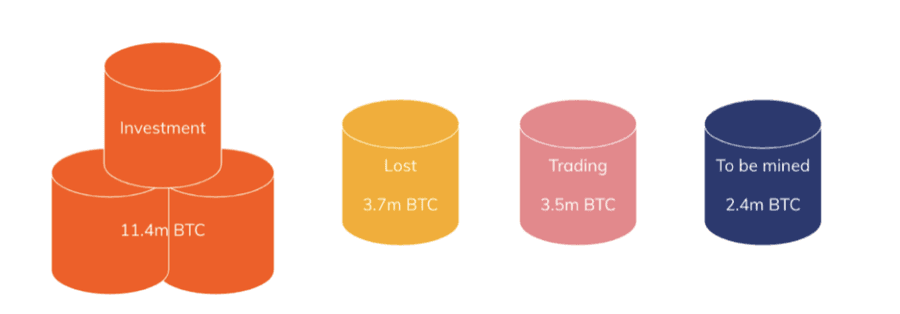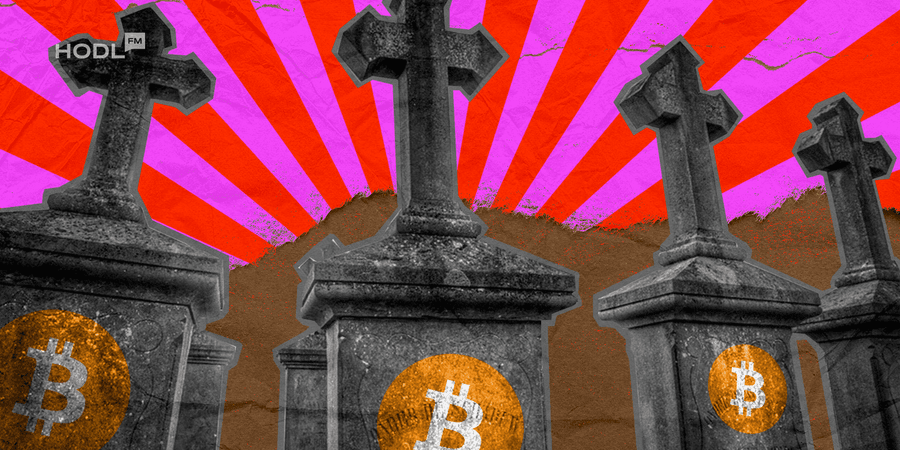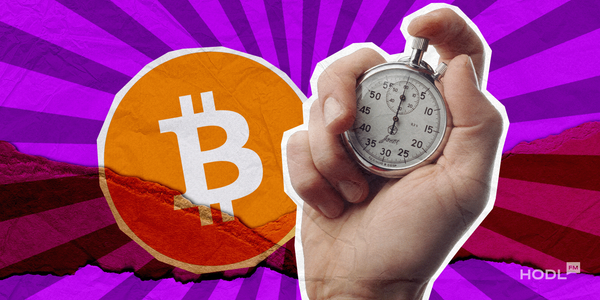Satoshi Nakamoto once said, “Lost coins only make everyone else’s coins worth slightly more; consider it a gift to all of us.”
But, it could be quite challenging to adopt that viewpoint if you just lost Bitcoin—unless you’re a Buddhist monk. Though, how many monks actually use Bitcoin?
Let’s try to understand what happens to lost or unclaimed Bitcoin. Some questions we’ll answer include:
- What actually happens to lost Bitcoin?
- Can they be recovered, or is it lost forever?
You’ll also get some helpful tips on how you can avoid losing your BTC in the future.
What Is a Lost Bitcoin?
So, “lost Bitcoin” basically refers to situations where the owners of those Bitcoins can’t access or use them again. This can happen for all sorts of reasons from lost seed phrase backup to sending BTC to wrong addresses.
How Many Bitcoins are Currently Lost?
It’s hard to know exactly how many lost Bitcoins there is. Sometimes people might have Bitcoins in a wallet that they just haven’t used in a long time. So it looks like they’re lost—but they’re not.
Chainalysis found that somewhere between 17% and 23% of all Bitcoins are lost. That could be like 2.78 million to 3.79 million Bitcoins!

There’s even a rumor that Satoshi Nakamoto might have around 1 million Bitcoins just sitting in their wallet. If that’s true, that’s a big chunk of the lost Bitcoins right there.
More Info: Crypto Calendar for the Next Half Year: June – December 2024
Where Do Lost Bitcoin Go?
Lost Bitcoins don’t really “go” anywhere. They just sit on the Bitcoin blockchain. To spend or move those Bitcoins, you need to have a special digital key that proves you own them.
So, when Bitcoins are “lost,” it really means that the owner has lost access to the digital keys needed to spend or move those Bitcoins. This is why people often say that lost Bitcoins are taken out of circulation. They still exist on the blockchain, though. But since they can’t be moved or spent, they are basically not part of the active Bitcoin economy anymore.

How Bitcoins Get Lost
There are several ways that Bitcoins can get lost. Here are some common scenarios of accidental Bitcoin loss:
- Losing your private keys: Your private keys are like the password to your Bitcoin wallet. If you lose them or forget them, it’s like losing the key to your safe. The Bitcoins are still there, but you can’t access them anymore.
- Throwing away a hard drive: In the early days of Bitcoin, many people mined Bitcoins on their personal computers. Some of these people threw away their old hard drives without realizing they had Bitcoins on them. James Howells is an example. He unintentionally lost 8,000 BTC after throwing a hard drive in the trash. That’s almost $250 million worth of Bitcoin sitting pretty in a landfill—lost forever.
- Sending to the wrong address: If you’re not careful when sending Bitcoins, you might accidentally type in the wrong wallet address. If you send your Bitcoins to an address that doesn’t exist, or to one where nobody has the private keys, those Bitcoins are lost.
- Death of the owner: If someone who owns Bitcoins passes away without sharing their private keys with anyone, those Bitcoins will be lost. It’s like burying your treasure and not telling anyone where it is.
- Hacking or theft: If a hacker gets access to your private keys and steals your Bitcoins, it’s very difficult (if not impossible) to get them back. Those stolen Bitcoins might be considered “lost” from your perspective.
- Forgetting about them: Some people bought or mined Bitcoins years ago and forgot about them. They might have a few Bitcoins sitting in an old wallet somewhere. But if they can’t remember how to access them, those unclaimed Bitcoins are essentially lost.
Can Lost Bitcoins Ever Be Found?
In some cases, lost Bitcoins might be recoverable. It just depends on how they were lost.
If you lose your private key or password, there might be hope. Some companies can help you brute force your wallet and access it. But, the success rate is slim—and their services can be pricey.
Another potential recovery method is using a “seed phrase” backup. If you’ve kept your seed phrase safe, you might be able to recover your lost Bitcoins.

But, losing Bitcoins because you sent to the wrong address or it got hacked is usually gone for good. Bitcoin transactions are irreversible—so there’s little you can do.
Losing Bitcoins due to discarding an old hard drive or death without sharing wallet info are also likely lost forever.
How Lost or Unclaimed Bitcoin Impact the Network
Lost or unclaimed Bitcoins affect the Bitcoin network and economy in a few ways.
When Bitcoins are lost, they’re taken out of circulation. They still exist on the blockchain, but they’re not being traded. This makes the remaining Bitcoins more scarce, and potentially more valuable.
But, if too many Bitcoins are lost, it could harm people’s confidence in the currency. People might worry about losing their own Bitcoins. But so far, the losses haven’t been significant enough to really shake the system.
Lost coins also slightly impact the process of verifying transactions. When a Bitcoin transaction happens, computers on the network (miners) verify the transaction and add it to the blockchain, getting a small reward. But if a Bitcoin is lost and never moves, there’s no transaction to verify, so miners don’t get that tiny reward.
Plus, if many people lose their Bitcoins, it could theoretically make it easier for someone to manipulate the market. With fewer Bitcoins in active circulation, it might take less money to influence the price. But this would require a lot of lost coins—like a lot.
Securing Bitcoin Holding: Tips for Preventing Loss
When it comes to protecting your Bitcoin holdings, an ounce of prevention is worth a pound of cure. Here are some key tips to keep your Bitcoins safe and sound:
- Hardware Wallet Security: Consider investing in a hardware wallet. These are physical devices that store your private keys offline, making it much harder for hackers to steal your Bitcoins. They’re like a safe for your digital currency.
- Backup, Backup, Backup: Always, always, always backup your wallet. Write down your seed phrase and keep it somewhere secure, like a fireproof safe. This will be your lifeline to recovering your Bitcoins.
- Double Check Addresses: Accidental Bitcoin loss often happens when people send Bitcoins to the wrong address. Always double or triple check the address before hitting send. Once those Bitcoins are gone, they’re usually gone for good.
- Keep Your Private Key Private: Your private key is like the key to your Bitcoin kingdom. Guard it with your life. Never share it with anyone, and never store it on any device connected to the internet.
- Plan for the Future: None of us like to think about our own mortality, but it’s important to have a plan for your Bitcoins in case something happens to you. Make sure your loved ones know how to access your wallets.
Related: Cryptocurrency Security or How to Protect Yourself Against Cyber Threats
Safe Bitcoin is Happy Bitcoin
Remember, every lost coin contributes to Bitcoin supply scarcity. Sure, this can potentially drive up the value of remaining Bitcoins. It’s not really good for the overall health and stability of the network, especially if over 50% gets lost. Plus, it’s just a bummer to lose your hard-earned digital cash.
Being proactive about securing your Bitcoin holdings can help you prevent accidental loss and keep your Bitcoins safe and happy.
Disclaimer: All materials on this site are for informational purposes only. None of the material should be interpreted as investment advice. Please note that despite the nature of much of the material created and hosted on this website, HODL FM is not a financial reference resource and the opinions of authors and other contributors are their own and should not be taken as financial advice. If you require advice of this sort, HODL FM strongly recommends contacting a qualified industry professional.



